If you happen to stumble upon the “Stopping Tobacco Organizations & Products” (STOP) report…
You will quickly see that its 60+ pages are laden with allegations against Philip Morris International (PMI) and our business activities to accomplish our vision of a smoke-free future. You are perhaps wondering if there is any truth to these claims. Whether you have read the report or plan to, we invite you to spare a few moments and consider the following before deciding if activist organizations like STOP, and the agenda of the “interest groups” behind their activities, should be allowed to stand in the way of a major breakthrough in public health: A world without cigarettes.
Among other things, here’s what you’ll find in the STOP report:
1. You’ll find an abundance of information about alleged actions or statements that have nothing to do with PMI.
- Decades-old documents, adverts and statements made by our competitors that make no reference to PMI. Slides from competitors’ analyst briefings that have nothing to do with PMI’s business. Recent e-cigarette advertisements belonging to our competitors about their brands, not PMI’s. And clear attempts to dupe readers by referring to other companies as if they are part of, or linked to, PMI—for instance:
- Philip Morris USA is a subsidiary of Altria Group, Inc.
- PMI and Altria Group, Inc. have been separate companies for over a decade.
- PMI does not own any stake in Juul. Altria Group, Inc. does.
2. You’ll find deliberate references to old data and misguided assertions that PMI’s commercial strategy is inconsistent with its ambition to create a smoke-free future.
- Deliberate disregard for publicly available data as STOP erroneously claims that PMI cigarette sales increased from 500 billion units in 2017 to 740 billion units in 2018. In fact, PMI’s cigarette shipment volumes declined from approximately 762 billion units in 2017 to approximately 740 billion units in 2018 and to approximately 707 billion units in 2019 (all of these figures were available prior to the STOP report’s release).
- Claims that the decline in cigarette sales in markets where IQOS has been launched is “highly unlikely” to be attributed (even partially) to the launch of IQOS, despite publicly available evidence from Japan to suggest that it is, including this latest study.
- No evidence to support their claim that the number of adult men and women who have stopped smoking and switched to IQOS is significantly lower than PMI estimated data for Q3 2019 (approximately 8.8 million—see here).
- No disclosure of the methodology used to claim that PMI has only launched IQOS in markets with strong tobacco regulation (based on the authors’ attempts to “create a composite MPOWER score (higher score=stronger regulation)”. In terms of the ‘strength of tobacco control measures,’ there is no correlation between markets where we have already launched our heated tobacco product and those where it has not been commercialized. See here and here.
- A failure to acknowledge that regulatory prohibitions represent one of the key barriers to wider IQOS availability and awareness today.
- Unexpected criticism of PMI for not selling its heated tobacco device and/or related tobacco consumables at lower prices, to provide an additional incentive for smokers to switch from cigarettes. PMI’s efforts to switch adults who would otherwise continue smoking are also geared toward affordability. The stance of this “special interest group” is surprising, so we would welcome its views on how even lower pricing could be achieved without risking unintended consequences of triggering increased consumption and/or youth uptake.
PMI estimated data for Q3 2019
.jpeg)
MPOWER score
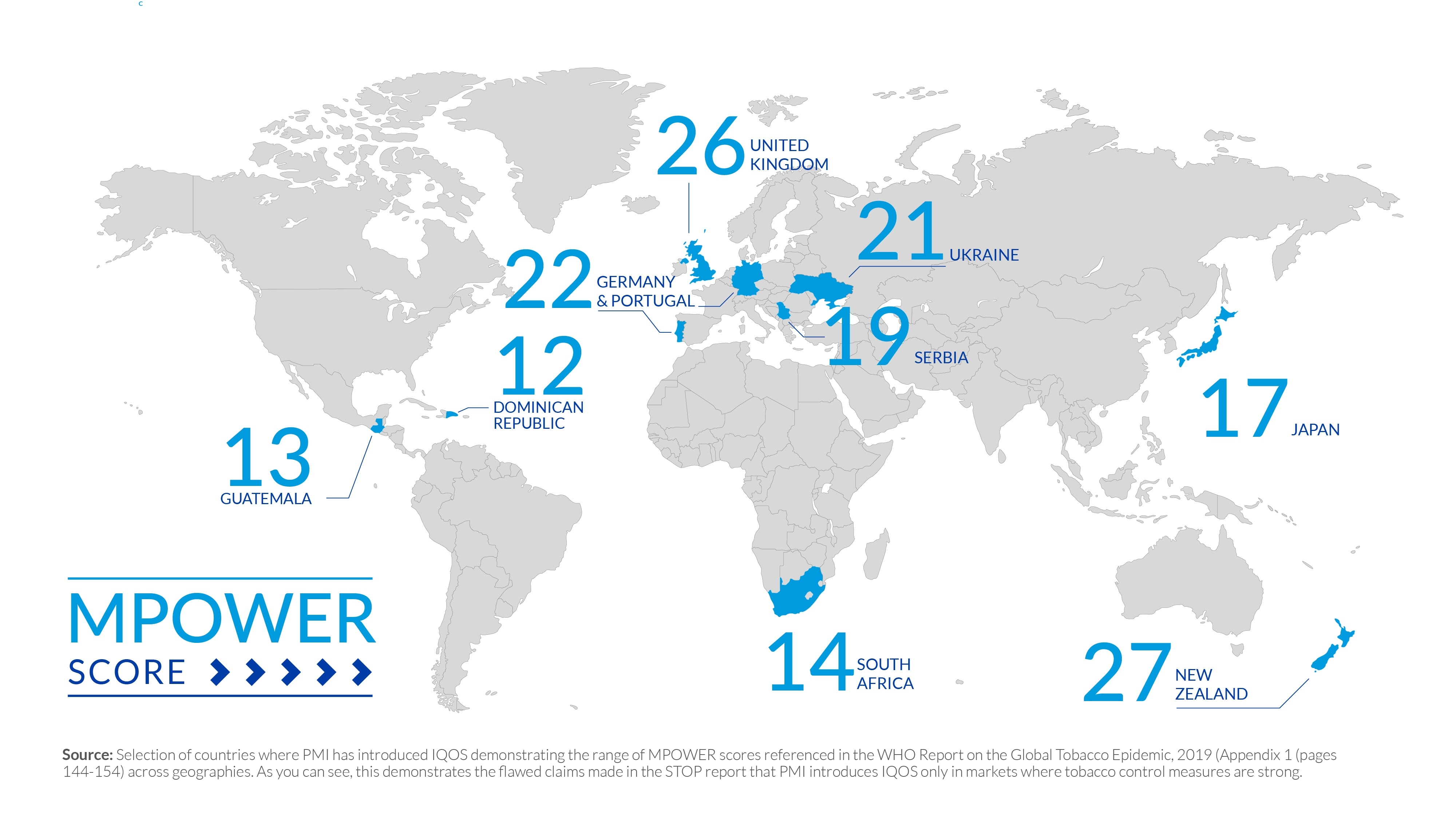
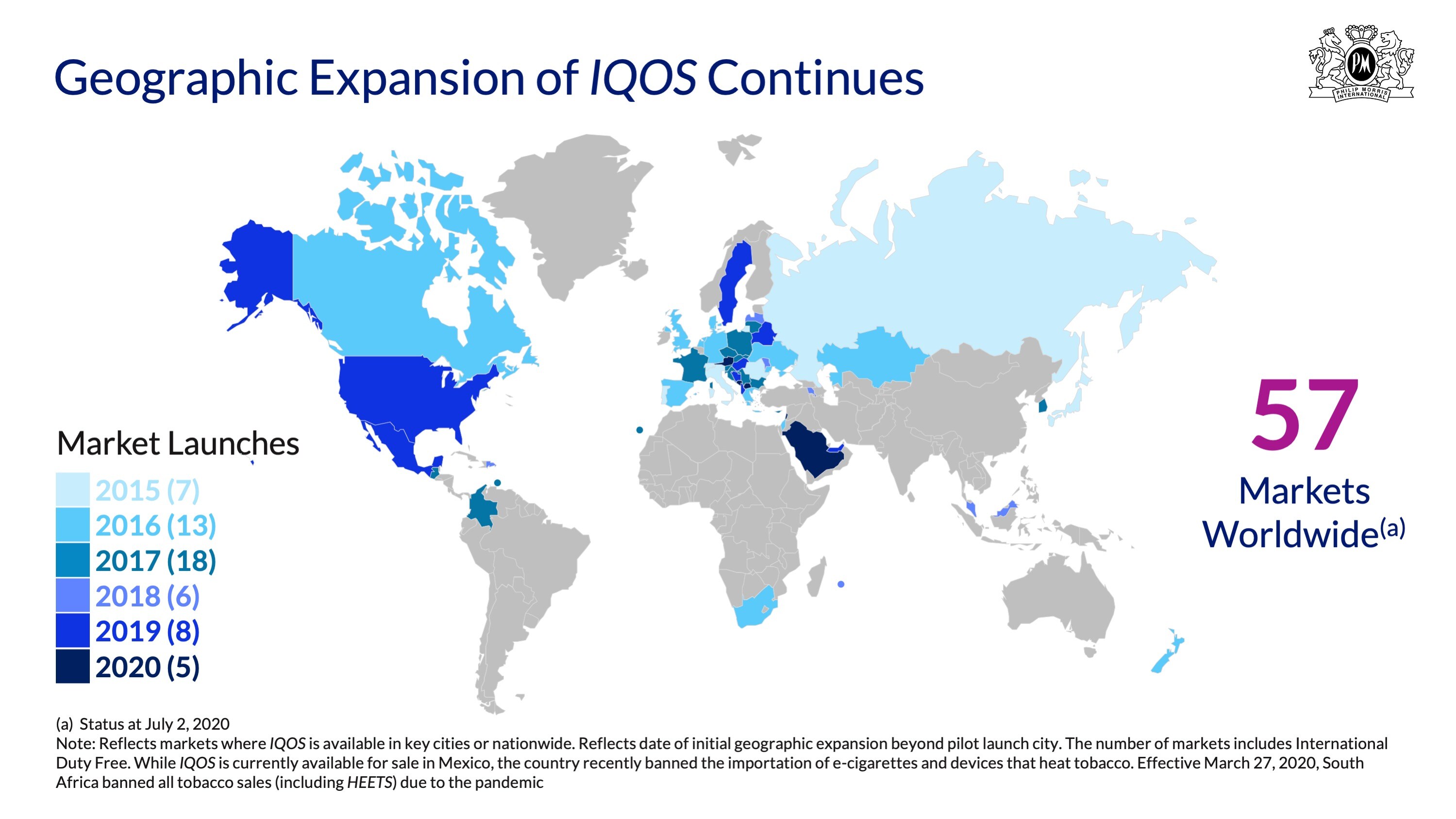
3. You’ll find a cooked up conspiracy desperate to reveal a “cover up” where there is none
- For instance, referring to the Foundation for A Smoke-Free World—an independent, non-profit organization which has as its goal to promote and support significant scientific research that advances the field of tobacco harm reduction and reduces the public health burden of smoking-related diseases.
- PMI affiliate annual contributions to date are a matter of public record (https://www.smokefreeworld.org/our-vision/financials/).
- The Foundation is required to make all its decisions on its own, free from the influence of PMI or any third party.
- All inquiries about the Foundation’s activities should be directed to the Foundation.
4. You’ll find deference to a single piece of scientific “research” about IQOS, despite concerns over its quality from independent experts:
- While independent experts as well as highly respected scientific institutions, not least the U.S. Food and Drug Administration (FDA), also expressed concerns about the quality of the Research Letter (see here and here).
- Naturally, there is no mention of the growing body of independent studies related to IQOS .
5. You’ll find absolutism and fearmongering:
- Claims that PMI is “not fully transformed” thus not “transforming” are regressive. Change doesn’t happen overnight. PMI is the only tobacco company with a purpose to replace cigarettes as quickly as possible with better alternatives for the millions of adult smokers who would otherwise continue smoking. And to show that we’re serious, we’ve set ourselves Business Transformation Metrics which are publicly reported in our 2019 integrated report (see page 4), to track our progress and so that others can hold us to account.
- Accusations that PMI’s product marketing for IQOS is aimed at youth.
- PMI’s view on this issue is clear: Youth should not use tobacco and nicotine products. We do not market our products to youth and our actions are governed by marketing standards and Good Conversion Practices—confirmed by this statement from our CEO. PMI also believes that regulation, as well as industry practices, should reflect the fact that youth should not consume nicotine in any form.
- We are unaware of any studies or data that suggest our marketing practices are resulting in youth uptake of any of our smoke-free products. A number of independent studies have been conducted in this area, which are available here.
- Fearmongering through speculation that PMI plans to launch a Mission Winnow tobacco product.
- Such speculations are utterly unfounded. Mission Winnow is not, nor will it be used as, a platform to advertise or promote any PMI-branded tobacco- or nicotine-containing product.
6. And, last but not least, you’ll find a censorship agenda mischaracterizing legitimate attempts by PMI to transparently share our science and encourage open debate:
- STOP attacks PMI’s legitimate attempts to engage with stakeholders and mischaracterizes transparent engagements to share our science with reporters. Challenging the right of individuals and the media to receive information and report it to the public is—in a word—censorship. We believe open dialogue is the only way to solve a complex problem like cigarette smoking. Consequently, our open-door policy applies to everyone, so when journalists express an interest to visit our R&D facility in Neuchâtel to interview our scientists, we welcome them—and will continue to do so—just as we would welcome the STOP report authors. Meanwhile, as decisions on the future of global tobacco control continue behind closed doors without public scrutiny, wherever we are excluded, we will work to ensure that our views are heard. We have nothing to hide.
Here’s what you won’t find in the STOP report:
- You won’t find the independent study published by researchers from the American Cancer Society which states that IQOS likely reduced cigarette sales in Japan. Of note, another notable study was recently issued on this topic.
- You won’t find information about PMI cigarette shipment volume trends over the past five years since the introduction of our smoke-free products, and publicly available data that shows that heated tobacco products are replacing—rather than adding to—cigarette shipment volumes.
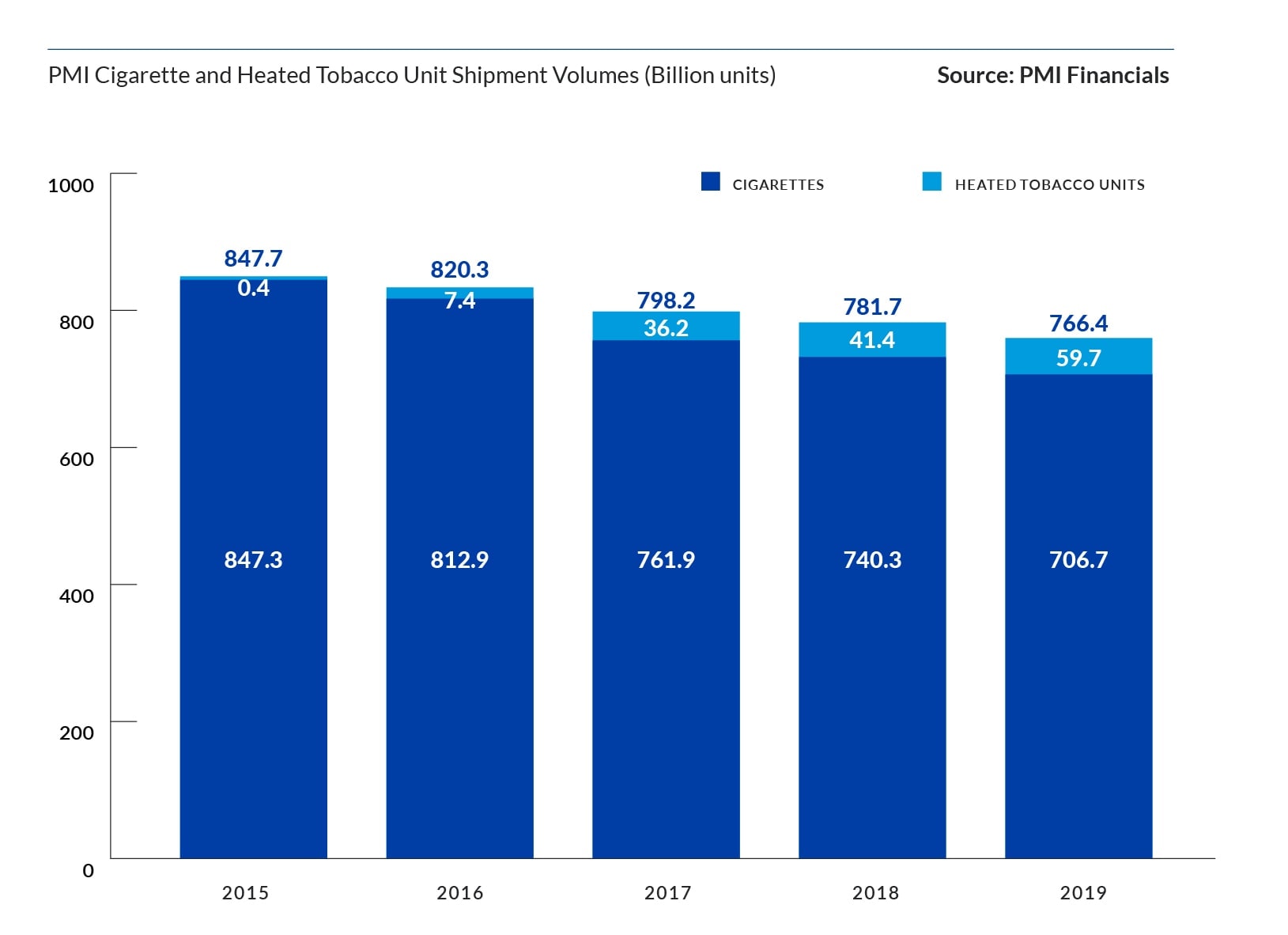
- You won’t find any note of how smoke-free products represented almost a fifth of our total net revenues in 2019 (see below)—up from zero five years prior, and from two pilot cities (Nagoya and Milan) to over 50 markets worldwide today.
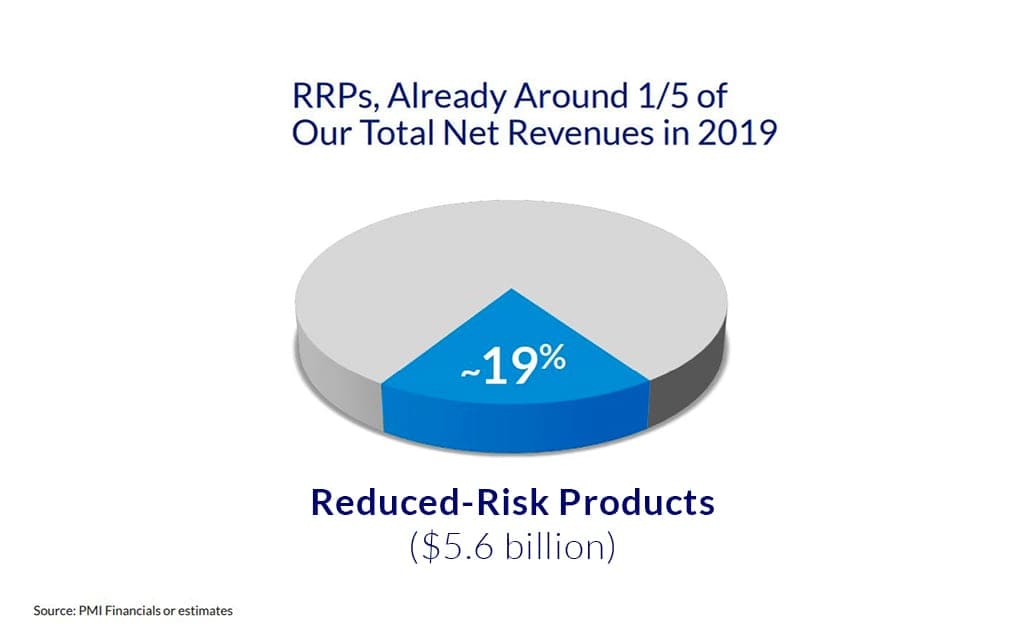
* "Reduced-risk products," or "RRPs," is the term PMI uses to refer to products that present, are likely to present, or have the potential to present less risk of harm to smokers who switch to these products versus continuing smoking. PMI has a range of RRPs in various stages of development, scientific assessment and commercialization. PMI RRPs are smoke-free products that produce an aerosol that contains far lower quantities of harmful and potentially harmful constituents than found in cigarette smoke.
- You won’t find a mention of PMI’s aspiration that by 2025, assuming constant market share, our net revenues from smoke-free products will amount to 38–42 percent of our total net revenues.
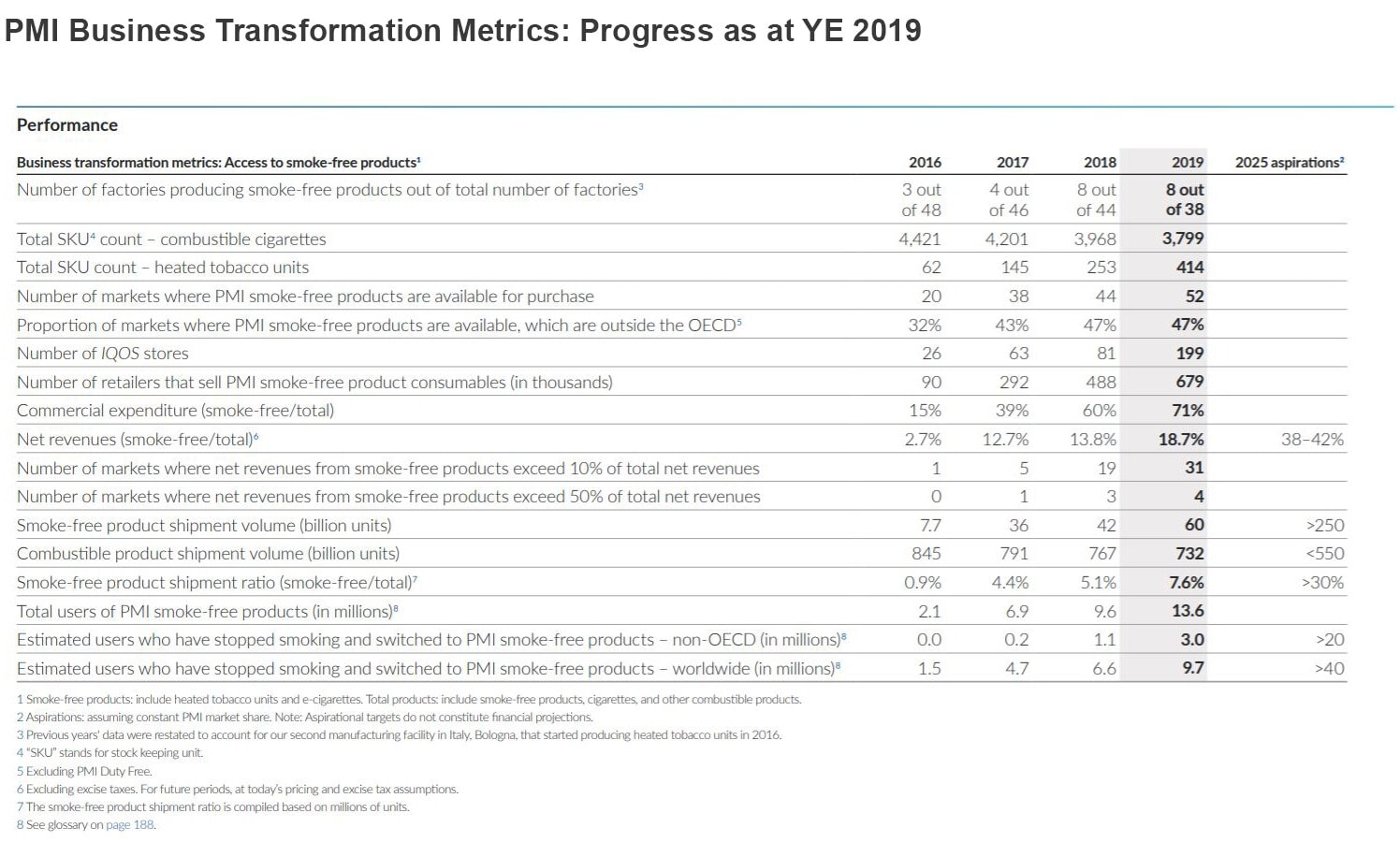
- You won’t find this publicly-available data (see below)—available at the time of publication of the STOP report—showing that, as of December 31, 2019, approximately 10 million adults had stopped smoking and switched to IQOS.
.jpeg)
- You won’t find any hint of the many other areas of progress we’re making in our transformation, demonstrating our commitment to sustainable business practices and to society.
- You won’t find a reference to PMI’s Responsible Marketing Practices and a report on their implementation, openly available on our website. At PMI, we strive to continue earning the trust and active cooperation of a host of stakeholders, from our supply chain partners to regulators and public health authorities.
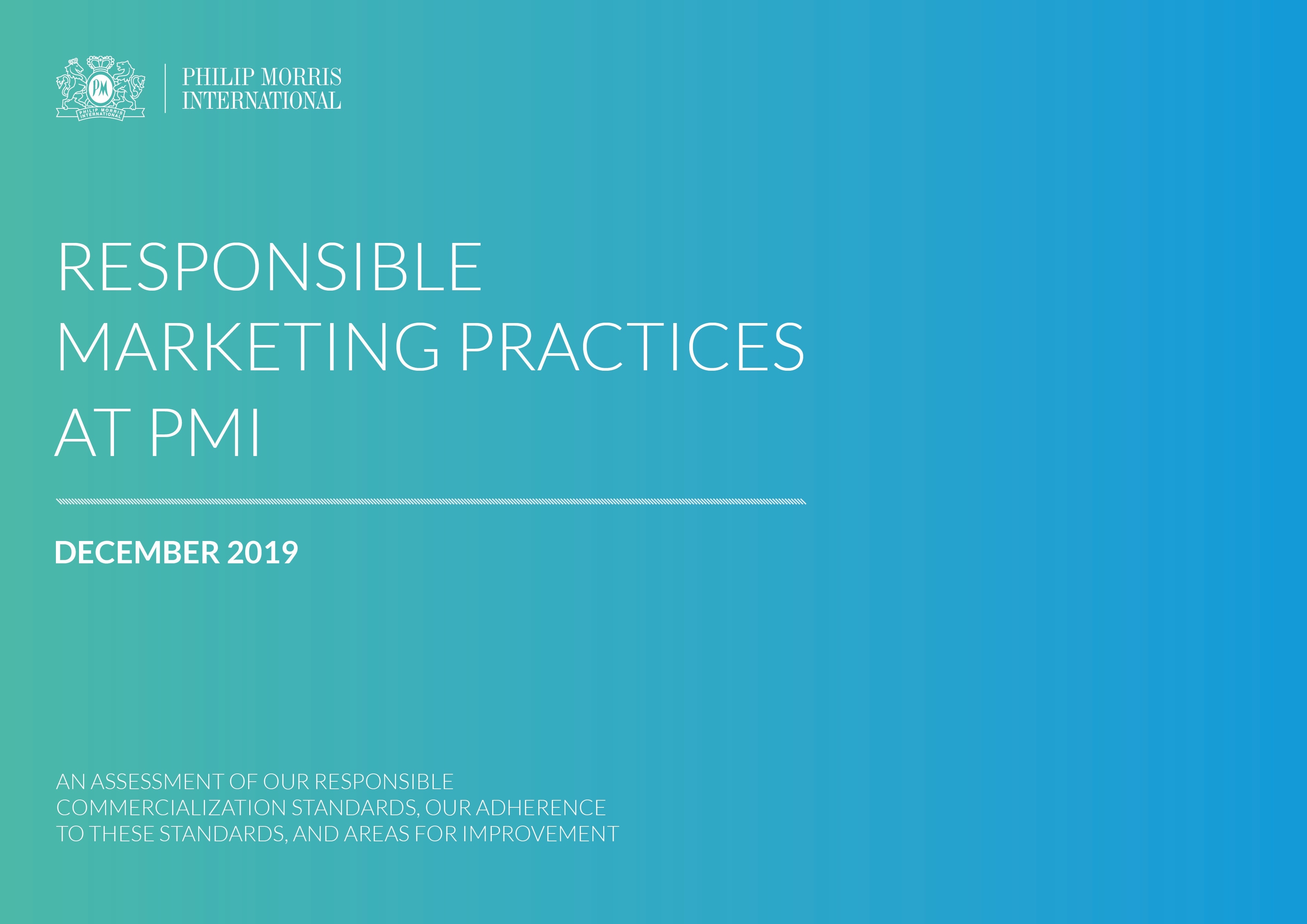
- And: You certainly won’t find any offer of hope, solutions or dialogue for the millions of men and women who continue to smoke.
All of this public information doesn’t support the authors’ narrative so, naturally, it was omitted.
But our resolve is strong. And our ambition to completely transform our business and achieve a smoke-free future means that we’re squarely and irrevocably focused on what matters: Relegating cigarettes to history as soon as possible. It’s important for adult smokers who want information about and access to better alternatives than cigarettes. And it’s important for anyone who really cares about not missing this enormous public health opportunity. In fact, it’s important for everyone.

